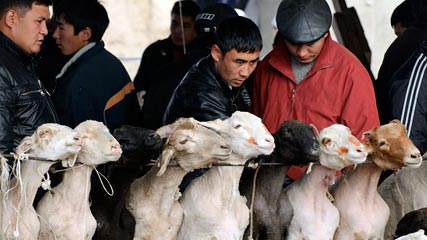ISTANBUL (Nov. 16) — Two Turkish men seized a struggling lamb from a crowded pen and dragged it by its front feet so it was walking on its hind legs to the corner of a parking lot here. They then held the lamb down and one of the men slit the kicking lamb’s throat with a short, sharp knife. Next, they sliced off the lamb’s head and skin and finally cut the meat into parts, which were put into plastic bags that were carried off by a satisfied customer in a denim jacket.

This ritual of slaughtering of lambs and also cows, goats and other animals is happening across Turkey and many other countries in the region today as the Muslim world begins the four-day Eid al-Adha, the festival of the sacrifice. The purchase and sacrifice of animals is a tradition inspired by a story from the Koran that many Christians might also remember from the Old Testament.
Abraham, who is known as a prophet to Muslims and is considered to be the forefather of Jews and Christians, is preparing to sacrifice his son to God. At the last moment, an angel appears to tell him he should instead sacrifice a ram and Abraham’s son is saved, his devotion to God proved.
In Turkey the festival is commonly known as Bayram. Many people return to their hometowns to visit with family members or take vacations. In Istanbul alone there are more than 480 official slaughtering points.
“Among Muslim countries, Turkey has the highest observance of the slaughter ritual,” Turkish theologian Ihsan Eliacik told the local newspaper Hurriyet Daily News.
Some estimate that more than a million animals will be slaughtered this year in Turkey. Though it is illegal to do outside the official areas, some people still slaughter the animals themselves on the street or in their backyards, sometimes even in their balconies.
The tradition also includes giving away some of the meat to people who cannot afford animals of their own.
Charity toward the poor is common in Muslim countries and one of the five principal tenets of Islam. Turkey is extending this charity further with individuals making donations of meat to impoverished people in other Muslim countries, part of the country’s increasingly far-ranging foreign policy. Organizations such as Cansuyu even let Turks avoid the messy sacrificing and allow them to pay for meat to be given to Muslim families across the world.
Donations to Pakistan, Asia and Africa are $136 and donations to the West Bank and Balkan countries are $239. Turkey is $307 and Gaza $341.
The IHH Humanitarian Relief Foundation, which sponsored the now-infamous flotilla bringing humanitarian aid to Gaza this past summer, is another organization that delivers donated meat for Bayram to people outside of Turkey.
“Bayram conduces us to go to all these different countries. It is really difficult to afford all these organizational costs, but Bayram is like our ships to go and see these places,” Salih Bilici, a spokesman for the organization, told AOL News.
Bilici said IHH had received 33,000 donations for this year’s Eid. The donations will be sent to the poor and disadvantaged in the different countries were IHH works.
“Besides, this Bayram is very important for Muslims because it brings us together and promotes the fraternity and solidarity,” he added. “The more Turkey develops, the more civil society strengthens and expands. Turkey is more developed and its civil society is more progressive than other Muslim countries.”
aolnews

Leave a Reply